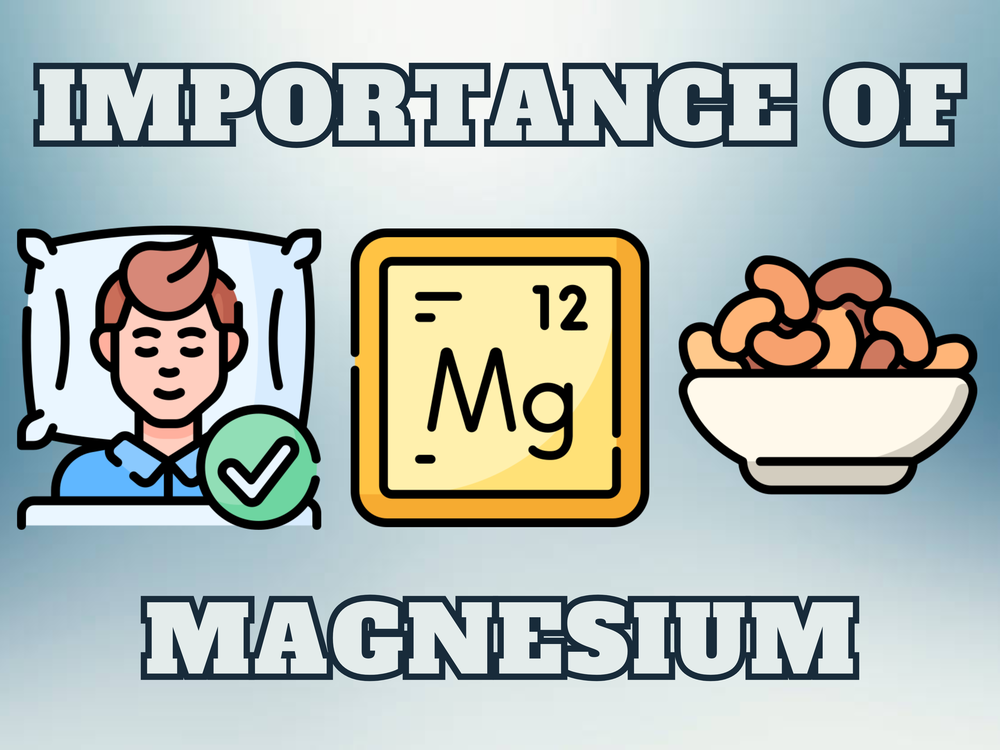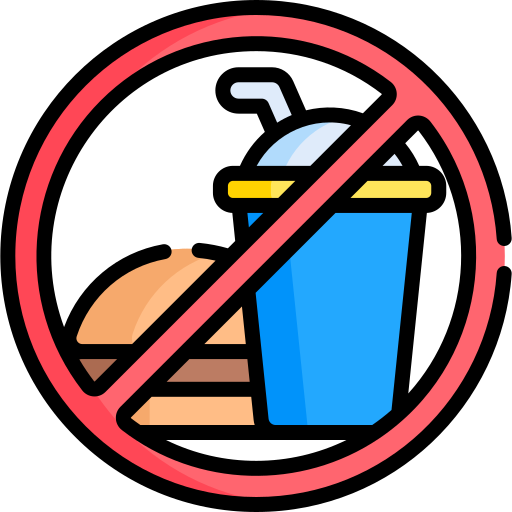
Introduction
Magnesium (Mg) is one of the most important micronutrients, playing a supportive role in muscle recovery, sleep, and stress reduction, just to name a few. Outside of iron, calcium, potassium, and vitamin D, no micronutrient is required to be present on a nutrition label. Which is a shame, because most people should be paying more attention to their magnesium intake.

Along with sodium and potassium, magnesium is a critical electrolyte for your body. Often lost during sweating, magnesium plays a vital role in forming the structures of proteins, mitochondria, and bones in your body. Magnesium has been shown to not only aid in recovery by reducing muscle cramps and soreness, but it can also lead to improved exercise performance.

Magnesium is crucial for muscle and mind relaxation, ATP production, gene maintenance, nervous system regulation, formation of proteins, and much more. This mineral is a cofactor in hundreds of different biochemical reactions in your body, and is found in ample amounts in nuts, seeds, and beans.

High Magnesium Foods

Why Do You Need Magnesium?
It's estimated that 75% of American adults are magnesium deficient. This is largely in part due to our ultra-processed diet, which is entirely void of most micronutrients, magnesium included. Most people don't realize they're deficient in this crucial mineral.

Optimal magnesium consumption is linked with better sleep, improved mood, protection against heart disease and Type 2 Diabetes, lower risk of cancer, lower blood pressure and cortisol, and improved mood. Quite literally, a magnesium supplement is a "chill pill"; magnesium supplementation has been shown to significantly combat depression and anxiety. Magnesium supplements include powders, pills, and liquid droppers.

Consuming optimal levels of magnesium, either through food or supplementation, is vital to your health. Magnesium plays a role in protein synthesis, creation of DNA and RNA, muscle recovery and relaxation, preserving nerve and brain cells, and regulating blood sugar. These are all slowed down with alcohol and caffeine consumption, as magnesium is not able to perform its job properly.

Benefits of Magnesium

Symptoms of Magnesium Deficiency (Hypomagnesemia)

Daily Consumption

Foods High In Magnesium
Meat (raw)

Fish and Seafood (Raw unless specified)

Beans (dried)

Vegetables (Raw)

Fruit

Nuts

Seeds

Grains (Raw)

Dairy

Other

Best Sources of Magnesium
Per serving: Hemp Seeds - 196.0 mg (1 oz, 28g)
Per 100 g: Hemp Seeds - 700.0 mg
Per 100 cal: Swiss Chard - 426.3 mg
Wrapping it Up
Magnesium is an essential mineral and electrolyte that is rich in nuts, seeds, legumes, and dark leafy greens. It's critical for bone and muscle health and function, often aiding in recovery and preventing soreness and fatigue. Magnesium is also crucial in the production of ATP, aiding in converting food into energy for metabolism regulation. The RDA of magnesium is 400 mg for men and 310 for women, and symptoms of deficiency include muscle cramps, irritability, osteoporosis, and muscle cramps.
Benefits


Sources
This post may contain affiliate linksMagnesium (Mg) is one of the most important micronutrients, playing a supportive role in muscle recovery, sleep, and stress reduction, just to name a few. Outside of iron, calcium, potassium, and vitamin D, no micronutrient is required to be present on a nutrition label. Which is a shame, because most people should be paying more attention to their magnesium intake.

Along with sodium and potassium, magnesium is a critical electrolyte for your body. Often lost during sweating, magnesium plays a vital role in forming the structures of proteins, mitochondria, and bones in your body. Magnesium has been shown to not only aid in recovery by reducing muscle cramps and soreness, but it can also lead to improved exercise performance.

Magnesium is crucial for muscle and mind relaxation, ATP production, gene maintenance, nervous system regulation, formation of proteins, and much more. This mineral is a cofactor in hundreds of different biochemical reactions in your body, and is found in ample amounts in nuts, seeds, and beans.

High Magnesium Foods

Why Do You Need Magnesium?
It's estimated that 75% of American adults are magnesium deficient. This is largely in part due to our ultra-processed diet, which is entirely void of most micronutrients, magnesium included. Most people don't realize they're deficient in this crucial mineral.

Optimal magnesium consumption is linked with better sleep, improved mood, protection against heart disease and Type 2 Diabetes, lower risk of cancer, lower blood pressure and cortisol, and improved mood. Quite literally, a magnesium supplement is a "chill pill"; magnesium supplementation has been shown to significantly combat depression and anxiety. Magnesium supplements include powders, pills, and liquid droppers.

Consuming optimal levels of magnesium, either through food or supplementation, is vital to your health. Magnesium plays a role in protein synthesis, creation of DNA and RNA, muscle recovery and relaxation, preserving nerve and brain cells, and regulating blood sugar. These are all slowed down with alcohol and caffeine consumption, as magnesium is not able to perform its job properly.

Benefits of Magnesium
- Lowers blood pressure
- Lowers blood sugar
- Improves mood
- Combats depression and anxiety
- Enhances sleep
- Enhances ATP production
- Improves immune system
- Improves thyroid health
- Lowers risk of diabetes
- Lowers risk of cancer
- Improves cardiovascular health
- Quicker muscle recovery
- Prevents fatigue and light-headedness
- Reduces brain fog
- Improves insulin sensitivity
- Combats metabolic syndrome
- Prevents muscle cramps
- Lowers cortisol
- Benefits muscle and nerve function
- Aids in DNA repair
- Aids in energy production
- Aids in protein synthesis
- Improves bone density
- Reduces inflammation
- Improves symptoms of PCOS
- Prevents migraines

Symptoms of Magnesium Deficiency (Hypomagnesemia)
- Nausea
- Fatigue
- Appetite loss
- Anxiety
- Depression
- Migraines
- Muscle cramps
- High blood pressure
- Type 2 Diabetes
- Insulin Resistance
- Metabolic Syndrome
- Heart disease
- Chronic Inflammation
- Brain fog
- Osteoporosis
- Mood swings
- Elevated cortisol
- Elevated glucose, insulin, and A1C
- Weakness
- Numbness
- Tingling
- Abnormal heart beat
- Seizures
- Hypocalcemia (low calcium levels)
- Hypokalemia (low potassium levels)

Daily Consumption
- Men: 400 mg
- Women: 310 mg
- Optimal Test Range: 5.0 - 6.4 mg/dL
- Note: Absorption rate of magnesium is about 30-40%, and can be improved with sufficient protein, vitamin B6, vitamin D, and selenium intake

Foods High In Magnesium
| Food | Serving Size | Magnesium Per Serving |
Magnesium Per 100 g |
Magnesium Per 100 cal |
|---|---|---|---|---|
| Chicken Breast (Boneless & Skinless) |
4 oz (113 g) |
32 mg (8 %) |
28 mg (7 %) |
23 mg (6 %) |
| Pork Tenderloin | 4 oz (113 g) |
31 mg (7 %) |
27 mg (6 %) |
25 mg (6 %) |

Fish and Seafood (Raw unless specified)
| Food | Serving Size | Magnesium Per Serving |
Magnesium Per 100 g |
Magnesium Per 100 cal |
|---|---|---|---|---|
| Anchovies (Canned) |
1.6 oz (45 g) |
31 mg (7 %) |
69 mg (16 %) |
33 mg (8 %) |
| Cod | 3 oz (85 g) |
27 mg (7 %) |
32 mg (8 %) |
39 mg (10 %) |
| Lobster | 3 oz (85 g) |
32 mg (8 %) |
38 mg (9 %) |
49 mg (12 %) |
| Mackerel (Canned) |
3 oz (85 g) |
31 mg (8 %) |
37 mg (9 %) |
24 mg (6 %) |
| Mussels | 3 oz (85 g) |
29 mg (7 %) |
34 mg (8 %) |
40 mg (9 %) |
| Octopus | 3 oz (85 g) |
26 mg (6 %) |
30 mg (7 %) |
37 mg (9 %) |
| Salmon | 3 oz (85 g) |
25 mg (6 %) |
29 mg (7 %) |
20 mg (5 %) |
| Sardines (Canned) |
3 oz (85 g) |
33 mg (8 %) |
39 mg (9 %) |
19 mg (4 %) |
| Squid | 3 oz (85 g) |
28 mg (7 %) |
33 mg (8 %) |
36 mg (9 %) |

Beans (dried)
| Food | Serving Size | Magnesium Per Serving |
Magnesium Per 100 g |
Magnesium Per 100 cal |
|---|---|---|---|---|
| Black Beans | 1/4 cup (50 g) |
86 mg (21 %) |
171 mg (41 %) |
50 mg (12 %) |
| Kidney Beans | 1/4 cup (50 g) |
69 mg (17 %) |
138 mg (33 %) |
41 mg (10 %) |
| Navy Beans | 1/4 cup (50 g) |
88 mg (21 %) |
175 mg (42 %) |
52 mg (12 %) |
| Pinto Beans | 1/4 cup (50 g) |
88 mg (21 %) |
176 mg (42 %) |
51 mg (12 %) |
| Soybeans | 1/4 cup (50 g) |
140 mg (34 %) |
280 mg (67 %) |
63 mg (15 %) |

Vegetables (Raw)
| Food | Serving Size | Magnesium Per Serving |
Magnesium Per 100 g |
Magnesium Per 100 cal |
|---|---|---|---|---|
| Artichoke | 1 cup (150 g) |
63 mg (15 %) |
42 mg (10 %) |
79 mg (19 %) |
| Spinach (Fresh) |
1 cup (30 g) |
24 mg (6 %) |
79 mg (19 %) |
343 mg (83 %) |
| Swiss Chard | 1 cup (36 g) |
29 mg (7 %) |
81 mg (19 %) |
426 mg (100 %) |

Fruit
| Food | Serving Size | Magnesium Per Serving |
Magnesium Per 100 g |
Magnesium Per 100 cal |
|---|---|---|---|---|
| Avocado | 1 avocado (136 g) |
39 mg (10 %) |
29 mg (7 %) |
17 mg (4 %) |
| Banana | 1 banana (110 g) |
30 mg (7 %) |
27 mg (6 %) |
30 mg (7 %) |
| Coconut | 1 oz (28 g) |
9 mg (2 %) |
32 mg (8 %) |
9 mg (2 %) |
| Date | 6 Deglet Noor 2 Medjool (40 g) |
17 mg (4 %) |
43 mg (10 %) |
15 mg (4 %) |
| Fig (dried) | 1/4 cup (40 g) |
27 mg (6 %) |
68 mg (16 %) |
27 mg (6 %) |

Nuts
| Food | Serving Size | Magnesium Per Serving |
Magnesium Per 100 g |
Magnesium Per 100 cal |
|---|---|---|---|---|
| Almonds | 1 oz (28 g) |
76 mg (18 %) |
270 mg (64 %) |
47 mg (11 %) |
| Brazil Nuts | 1 oz (28 g) |
105 mg (25 %) |
376 mg (90 %) |
57 mg (14 %) |
| Cashews | 1 oz (28 g) |
82 mg (20 %) |
292 mg (70 %) |
53 mg (13 %) |
| Peanuts | 1 oz (28 g) |
47 mg (11 %) |
168 mg (40 %) |
30 mg (7 %) |
| Pine Nuts | 1 oz (28 g) |
70 mg (17 %) |
251 mg (60 %) |
37 mg (9 %) |

Seeds
| Food | Serving Size | Magnesium Per Serving |
Magnesium Per 100 g |
Magnesium Per 100 cal |
|---|---|---|---|---|
| Chia Seeds | 1 oz (28 g) |
94 mg (22 %) |
335 mg (80 %) |
69 mg (17 %) |
| Flax Seeds | 1 oz (28 g) |
110 mg (26 %) |
392 mg (93 %) |
74 mg (17 %) |
| Hemp Seeds | 1 oz (28 g) |
196 mg (47 %) |
700 mg (167 %) |
127 mg (30 %) |
| Pumpkin Seeds | 1 oz (28 g) |
166 mg (39 %) |
592 mg (141 %) |
106 mg (25 %) |
| Sesame Seeds | 1 oz (28 g) |
98 mg (24 %) |
351 mg (84 %) |
61 mg (15 %) |
| Sunflower Seeds | 1 oz (28 g) |
91 mg (22 %) |
325 mg (77 %) |
56 mg (13 %) |

Grains (Raw)
| Food | Serving Size | Magnesium Per Serving |
Magnesium Per 100 g |
Magnesium Per 100 cal |
|---|---|---|---|---|
| Amaranth | 1/4 cup (48 g) |
119 mg (28 %) |
248 mg (59 %) |
67 mg (16 %) |
| Brown Rice | 1/4 cup (46 g) |
53 mg (13 %) |
116 mg (28 %) |
32 mg (8 %) |
| Buckwheat | 1/4 cup (43 g) |
99 mg (24 %) |
231 mg (55 %) |
67 mg (16 %) |
| Oats | 1/2 cup (40 g) |
55 mg (13 %) |
138 mg (33 %) |
36 mg (9 %) |
| Popcorn | 3 tbsp (40 g) |
57 mg (14 %) |
143 mg (34 %) |
37 mg (9 %) |
| Quinoa | 1/4 cup (43 g) |
85 mg (20 %) |
197 mg (47 %) |
54 mg (13 %) |
| Whole Wheat Flour | 1/4 cup (31 g) |
42 mg (10 %) |
137 mg (33 %) |
40 mg (10 %) |
| Wild Rice | 1/4 cup (40 g) |
71 mg (17 %) |
177 mg (42 %) |
50 mg (12 %) |

Dairy
| Food | Serving Size | Magnesium Per Serving |
Magnesium Per 100 g |
Magnesium Per 100 cal |
|---|---|---|---|---|
| Greek Yogurt (Plain Nonfat) |
3/4 cup (170 g) |
19 mg (5 %) |
11 mg (3 %) |
19 mg (5 %) |
| Milk (Skim) |
1 cup (240 g) |
26 mg (7 %) |
11 mg (3 %) |
32 mg (9 %) |

Other
| Food | Serving Size | Magnesium Per Serving |
Magnesium Per 100 g |
Magnesium Per 100 cal |
|---|---|---|---|---|
| 100% Chocolate | 1 oz (28 g) |
92 mg (22 %) |
327 mg (78 %) |
51 mg (12 %) |
| Cocoa Powder | 1 tbsp (5 g) |
25 mg (6 %) |
499 mg (119 %) |
219 mg (52 %) |

Per serving: Hemp Seeds - 196.0 mg (1 oz, 28g)
Per 100 g: Hemp Seeds - 700.0 mg
Per 100 cal: Swiss Chard - 426.3 mg
Wrapping it Up
Magnesium is an essential mineral and electrolyte that is rich in nuts, seeds, legumes, and dark leafy greens. It's critical for bone and muscle health and function, often aiding in recovery and preventing soreness and fatigue. Magnesium is also crucial in the production of ATP, aiding in converting food into energy for metabolism regulation. The RDA of magnesium is 400 mg for men and 310 for women, and symptoms of deficiency include muscle cramps, irritability, osteoporosis, and muscle cramps.
Benefits
- Bone health
- Muscle function
- Energy production
- Nervous system support
- Heart health
- Blood sugar management
- Anti-inflammatory effects


Sources